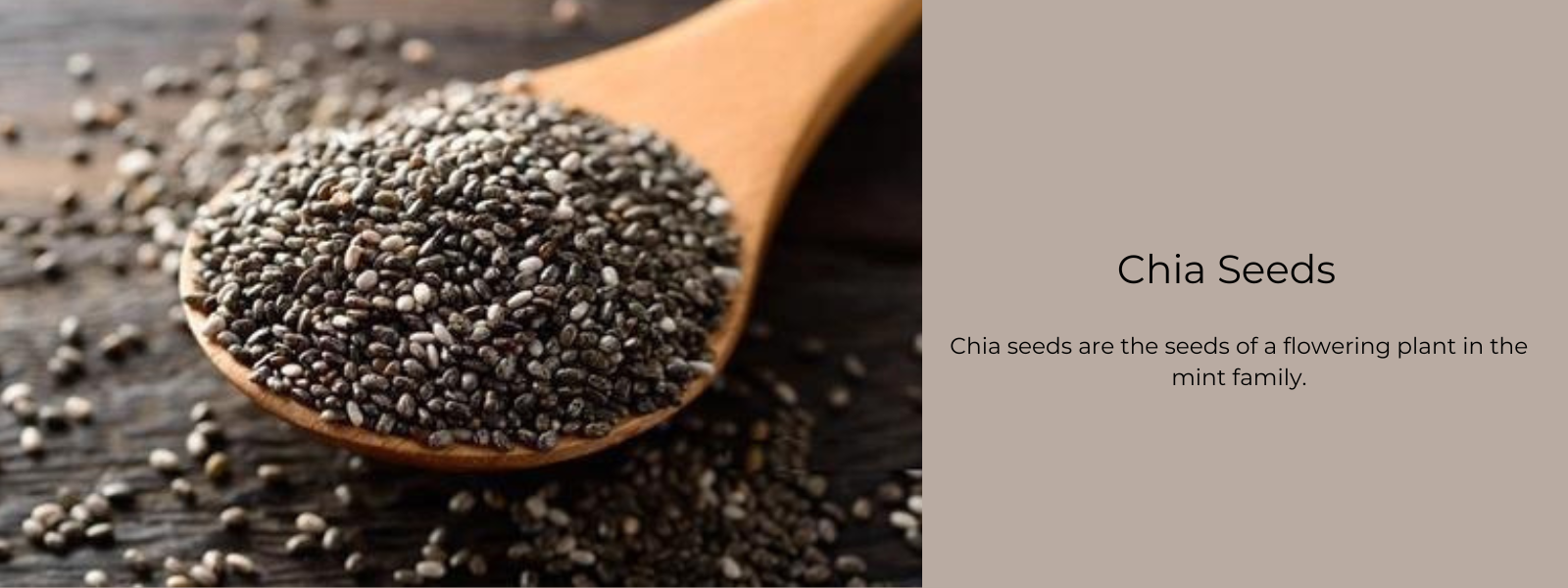Flax seeds are among the most adaptable of all seeds. They're in all kinds of dishes now, from oatmeal to acai bowls to smoothies. Nonetheless, they were initially put to use in the textile industry and remain so today. Since more and more people are concerned about their health and the quality of the food they eat, flax seeds have become increasingly mainstream.
Table of Contents
What are flax seeds?
The flax plant, from which flaxseed is harvested, is native to a wide range of Asian, European, and Mediterranean countries. The phytoestrogen found in these seeds, which range in colour from golden yellow to reddish brown, is structurally comparable to oestrogen. Oil and soluble fibre are also included in flaxseeds.
The seeds of the flax plant, which are high in fibre and Omega-3 fatty acids, are the primary reason the plant is farmed today. This has led to flaxseeds' meteoric rise in popularity as a trendy superfood. Many health professionals recommend adding them in your regular diet because of their "superfood" status.
The advantages of flaxseed are numerous. Our mental and physical well-being can benefit from regular ingestion. Because of their rising popularity, these seeds are now included in several pet food formulas.
Etymology of flax seeds:
Linum usitatissimum, which literally translates to "the most useful," is the Latin name for the flax plant. Alasi, Aliviraaii, common flax, brown-seeded flax, and many other names refer to the same plant.
Health benefits of flax seeds:
Omega-3 fatty acids are abundant in flaxseeds:
Omega-3 fatty acids, which are crucial to your body's proper functioning, may be found in abundance in flax seeds. About 1.8 grams of omega-3 fatty acids can be found in 1 tablespoon of powdered flax seeds. Furthermore, these seeds are a good source of alpha-linolenic acid (ALA), a plant-based omega-3 fatty acid.
Natural ALA production in humans is nonexistent. That's why we have to get it from somewhere else, like the food we eat. One study shows that people who consume ALA have a reduced chance of having a heart attack. Furthermore, it implies that alpha-Linolenic acid is an alternative to fatty acids that can protect the heart. One further study finds that ALA reduces the danger of stroke. Asthma, rheumatoid arthritis, and atherosclerosis are all diseases that can be avoided with its help.
Flax Seeds May Reduce Cancer Risk:
Lignans, a type of plant component with oestrogen and antioxidant characteristics, are abundant in flaxseeds. These substances are well-known for their ability to reduce cancer risk and enhance health in general. Flax seeds have up to 800 times the lignan concentration of other plant meals.
The chance of developing breast cancer may be reduced by consuming flax seeds, according to the results of an observational study. In breast cancer patients, it can slow the spread of tumours. Consuming flax seeds on a regular basis has also been shown to reduce the likelihood of acquiring malignancies of the prostate, colon, and skin.
Flax Seeds have Blood Pressure-Lowering Potential
The ability of flax seeds to help reduce blood pressure is only one of their numerous benefits. Thus, those who suffer from hypertension will benefit the most from them.
According to research, participants whose diets included 30 grams of flaxseeds daily for six months saw a reduction of 10 mm Hg in their systolic blood pressure. They saw a 7 mm Hg decrease in diastolic blood pressure over this time. Those whose blood pressure was already being controlled by medication had an even greater reduction.
Dietary fibre is found in flax seeds
Both soluble and insoluble fibres play important roles in the human diet. The digestive process is slowed by soluble fibre. It also makes the various bowel contents more solid. In addition, it aids in sugar and cholesterol management.
Softer stools are the result of insoluble fibre, which allows more water to bind to the faeces. As a result, it can be used as a laxative to ease constipation. Those who suffer from IBS or chronic diarrhoea also benefit from it. The dietary fibre in flax seeds helps maintain a regular bowel routine and is good for the digestive system as a whole.
High-Quality Protein Can Be Found In Flax Seeds
Flax seeds are loaded in glutamic acid, aspartic acid, and amino acid-rich plant-based proteins. For vegetarians and vegans, this is an excellent source of protein.
Several studies have demonstrated the health benefits of flax seed protein, including its ability to boost the immune system, inhibit tumour growth, and reduce cholesterol. The antifungal effects of flax seeds are an added bonus.
Flaxseeds have been linked to a reduction in cholesterol
One of flax seeds' many advantages is their capacity to reduce blood cholesterol levels. They have a lot of fiber, which is why. Those with high cholesterol may see a 17% drop in their readings after consuming flaxseed powder daily for three months, according to a research. Simultaneously, there may be a 20% reduction in "bad" LDL cholesterol.
The "good" HDL cholesterol levels of persons with diabetes were shown to increase by 12% after they consumed one tablespoon of flaxseed powder daily for a month. Hence, it follows that flaxseeds are also beneficial for patients with type 2 diabetes.
Flax Seeds can lower blood sugar levels
Those with diabetes should start using flax seeds in their diets. This is because the fibre in flax seeds has been shown to help control blood sugar levels. The insoluble fibre in flax seeds has been shown to reduce the rate at which sugar is absorbed by the blood. Hence, it may aid in lowering blood sugar levels.
Flax seeds is packed with vitamin E
Vitamin E is an essential ingredient that is contained in flax seeds along with many others. Vitamin E is an antioxidant that has been shown to reduce blood pressure. In addition, it helps lessen the chances of developing diseases including cancer, heart disease, and dementia. It accomplishes this by increasing the volume of sodium lost through urination.
Furthermore, flaxseed prevents the stomach from producing cancer-causing nitrosamines. Hence, it serves as a shield against cancer. The health of your hair and skin will also improve.
Ways to eat flax seeds:
Flaxseed can be consumed in a variety of ways. You can consume them whole or grind them into a powder. Flaxseeds can also be consumed via flaxseed oil. There are a variety of additional approaches to eating flax seeds every day:
- Toss your salad with a dressing that includes flaxseed, either ground, whole, or as oil.
- Yogurt with flaxseeds added is a healthy option.
- Sprinkle some ground flaxseeds over your morning dish of cereal or muesli.
- Put some flaxseeds in your smoothie. It also makes the smoothie more substantial.
- Add ground flaxseed to baked goods like muffins, bread, and cookies for a nutritional boost.
- Flaxseeds are a great addition to dishes that feature meats like chicken, beef, and fish.
- The weight loss benefits of flaxseeds can be obtained by simply adding them to one's water intake.
When and how much to eat flax seeds?
Two to four teaspoons of flax seeds per day is the recommended amount. Flax seeds are equally useful as a morning and evening snack. Some of their advantages may be more useful at various times, though.
High in protein and fibre, for instance, they are best consumed first thing in the morning. It is also a great technique to speed up your metabolism.
On the other hand, the sleep-inducing effects of serotonin are maximised when the supplement is taken at bedtime. Because of their high tryptophan and omega-3 fatty acid content, flax seeds are helpful for sleep.
FAQs on Flaxseeds:
Ques: Do women benefit from eating flax seeds?
Ans: Women stand to gain even more from eating flax seeds than men. It is believed that eating these seeds will assist a woman conceive and promote healthy ovulation. In addition, they are well-known for reestablishing a healthy hormonal balance in the body. It's also helpful for postmenopausal women who have heart issues.
Ques: What happens if you eat flaxseeds every day?
Ans: Constipation, stomach aches, and bloating are just some of the gastrointestinal negative effects that have been linked to regular consumption of flax seeds. Triglycerides are a type of blood fat, and it has the ability to raise their levels.
Ques: When and how should flaxseeds be consumed?
Ans: Flax seeds are most helpful because they help prevent bowel obstruction when eaten after being soaked. You can also add a couple of teaspoons of ground flaxseeds to your morning bowl of cereal. Mayonnaise and sandwich spreads can also benefit from having flaxseed powder added to them. Flaxseed powder can also be used in place of or in addition to flour when baking cookies, cakes, and other sweets.











Leave a comment